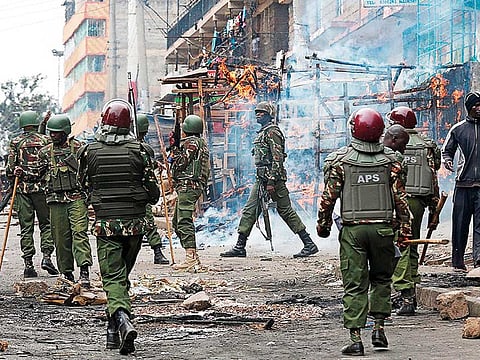Kenya tense after disputed vote sparks protests
Two killed during riots by opposition supporters

NAIROBI: Kenya was on edge on Saturday after the disputed re-election of President Uhuru Kenyatta sparked violent protests from opposition supporters who claim the vote was stolen from them.
While protests were limited to opposition strongholds, they came as a gloomy reminder of a disputed 2007 election which led to two months of ethno-political violence that left 1,100 dead and 600,000 displaced.
Police say they have shot and killed two people during riots by opposition supporters.
Leonard Katana, a regional police commander, said Saturday that the deaths occurred on the outskirts of Kisumu, a city where opposition leader Raila Odinga has strong support. Katana says another five people were injured by gunfire in Kisumu.
Also Saturday, Kenyan police opened fire to disperse opposition protesters who blocked roads and set up burning barricades in a slum in Nairobi, the capital. Police were seen firing live rounds in the Mathare area.
Kenyatta on Friday appealed for unity after the Kenyan election commission announced results following several days of vote-counting. Odinga has alleged that the election was rigged.
All eyes will now turn to opposition candidate Raila Odinga, and his reaction to his loss which he claimed was a result of massive rigging of Tuesday’s election, which his party denounced as a “charade” and a “disaster”.
Odinga, 72, is a veteran opposition politician seen as having taken his last shot at the presidency after four unsuccessful runs. He believes elections in 2007, 2013 and now 2017 were snatched away from him.
Amid the anxiety over how the situation would unfold, there was also much joy in Kenyatta’s strongholds after he was declared the victor with 54.27 per cent to Odinga’s 44.74.
“Let Uhuru rule. He is the best leader we have had,” said Simon Kipkoech in the town of Eldoret.
However, in Odinga strongholds in Nairobi’s slums and poor areas, almost immediate protests and outbursts of anger were seen after the electoral commission (IEBC) announced the result, with gunshots ringing out and fires lit in the streets.
Burnt tyres, debris and looted shops in the Kawangware slum in Nairobi bore testament to a night of running battles with police who tried to clear away rocks from the road, an AFP photographer said.
In the western city of Kisumu three young men were admitted to hospital with gunshot wounds, one to the jaw, another to a chest and a third, who gave his name as Michael Oluoch, 21, with a bullet to the thigh who said he had been shot by police.
Two men sustained gunshot wounds in the Mathare slum, according to an AFP photographer.
Human Rights Watch on Saturday urged police to show restraint in the face of protests.
“With growing reports of demonstrations and heavy gunfire in some areas, it is important for security forces to work to de-escalate — not escalate — the violence,” said Otsieno Namwaya, Africa researcher at HRW.
“The police should not use tear gas or live ammunition simply because they consider a gathering unlawful.”
‘Court is not an option’
Foreign observers praised a peaceful, credible voting process — which saw turnout of 78 per cent — but the mood quickly turned sour when Odinga rejected the results after only a few hours of counting.
The main opposition coalition, the National Super Alliance (NASA), has claimed both that the results were manipulated by a massive hacking attack, and that it is in possession of results being concealed on IEBC servers that show Odinga to be the rightful winner.
On Thursday it demanded Odinga be declared president on these grounds.
NASA on Friday demanded access to the IEBC’s servers, saying they would accept any result contained therein, as they remain convinced the commission has released manipulated results.
However, despite opposition requests for more time to resolve their concerns, the IEBC went ahead and announced election results amid a NASA boycott.
In 2013 Odinga took his grievances to court and lost.
“We have been there before. Court is not an alternative,” said top NASA official James Orengo.
‘Let us be peaceful’
After being declared the victor, Kenyatta reached out to Odinga and his supporters, to “work together ... so that we can build this nation together”.
“Let us be peaceful ... We have seen the results of political violence. And I am certain that there is no single Kenyan who would wish for us to go back to this.”
Odinga had called for calm from his supporters before the announcement, but added: “I don’t control anybody. People want to see justice.”
Six people have died in election-related violence, including two protesters in Nairobi shot dead by police on Wednesday.
In his first term, Kenyatta, 55, was credited with a massive infrastructure drive. However, his new government will face the rising debt as a result, and a predicted slowdown in growth from an average of more than five per cent in recent years.
A major issue on the campaign trail was a spike in food prices and shortage of the staple maize meal due to a prolonged drought, which has hit the country’s poorest hard.
Kenyatta’s administration has been dogged by several graft scandals, with the country dropping six points in Transparency International’s corruption index in 2016.


![The incident occurred in the early hours of Tuesday in Kampani Zurak community, located in the Wase area of Plateau state. [Illustrative image]](http://media.assettype.com/gulfnews%2Fimport%2F2022%2F12%2F13%2FSTOCK-ambulance_1850a298a2c_large.jpg?w=320&auto=format%2Ccompress&fit=max)
